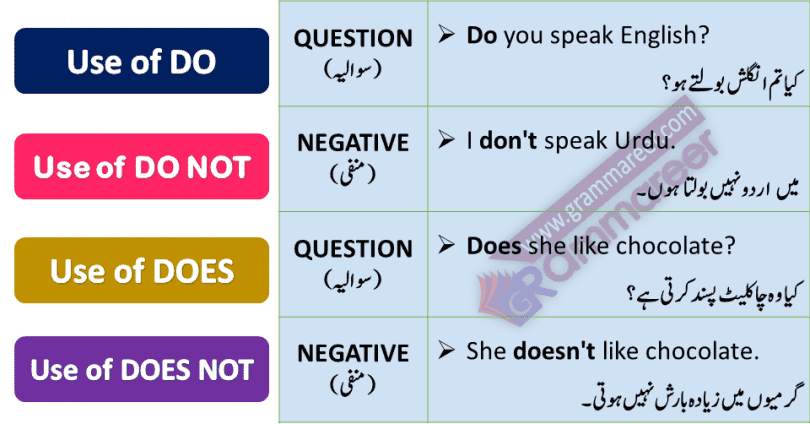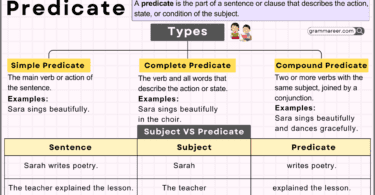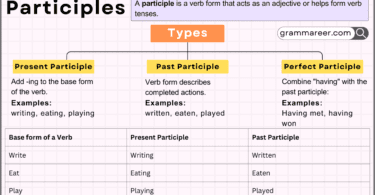DO, DOES, DON’T and DOESN’T with Urdu Translation this lesson is about learning use of do, does, do not and does not with Urdu translation and example sentences used in daily life for English speaking. English Grammar in Urdu, English speaking course in Urdu
We Use Do and Does to make questions in English. These are normally put at the beginning (before the subject).
ان کو سوالیہ فقرات بنانے کے لیے استعمال کرتے ہیں
یہ فقرے کے شروع میں استعمال ہوتے ہیں
Affirmative: You speak English.
تم انگلش بولتے ہو۔
Question: Do you speak English?
کیا تم انگلش بولتے ہو؟
You will see that we added DO at the beginning of the affirmative sentence to make it a question. We use Do when the subject is I, you, we or they.
| I, WE, YOU, THEY or Plural | DO |
| HE, SHE, IT or Singular | DOES |
Affirmative: He speaks English.
وہ انگلش بولتا ہے
Question: Does he speak English?
کیا وہ انگلش بولتا ہے؟
You have noticed that the letter S at the end of the verb in the affirmative sentence (because it is in third person) disappears in the question. We will see the reason why below.
DON’T use Do or Does in questions that have the verb To Be (is, am, are) or Modal Verbs (can, must, might, should etc.)
Word Order of Sentence Using DO and DOES
| DO | I, WE, YOU, THEY or Plural | Play | Hockey? |
| DOES | HE, SHE, IT or Singular | take | Dinner? |
Example Sentences
- Do you speak English?
کیا آپ انگلش بولتے ہیں؟
- Does Ahmad speak French?
کیا احمد فرانسیسی بولتا ہے؟
- Do we have time for taking food?
کیا ہمارے پاس کھانا کھانے کا وقت ہے؟
- Does it rain a lot in Lahore?
کیا لاہور میں بہت زیادہ بارش ہوئی ہے؟
- Do they want to come with me?
کیا وہ میرے ساتھ آنا چاہتے ہیں؟
- Does she like chocolate?
کیا وہ چاکلیٹ پسند کرتی ہے؟
Use of DON’T and DOESN’T
We Use Don’t and doesn’t to make negative sentences in English. Don’t or doesn’t with all verbs EXCEPT To Be (is, am, are) and Modal verbs (Can, might, should etc.).
Affirmative: He speaks Urdu.
وہ اردو بولتا ہے
Negative: He doesn’t speak Urdu.
وہ اردو نہیں بولتا ہے
You have noticed that we add don’t between the subject and the verb. We use don’t when the subject is I, you, we or they.
Contractions
Don’t = Do not
Doesn’t = Does not
I don’t like chicken = I do not like chicken.
Word Order of Negative Sentences Using Don’t and Doesn’t
| I, WE, YOU, THEY or Plural | Don’t | Play | Hockey |
| HE, SHE, IT or Singular | Doesn’t | take | Dinner |
- You don’t speak Urdu.
تم اردو نہیں بولتے ہو
- Ali doesn’t speak French.
علی فرینچ نہیں بولتا ہے
- We don’t have time for dinner.
ہمارے پاس ڈنر کے لیے وقت نہیں ہے
- It doesn’t rain much in summer.
گرمیوں میں زیادہ بارش نہیں ہوتی
- They don’t want to come with us.
وہ ہمارے ساتھ نہیں آنا چاہتے
- She doesn’t like meat.
وہ گوشت پسند نہیں کرتی ہے





